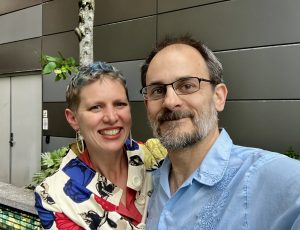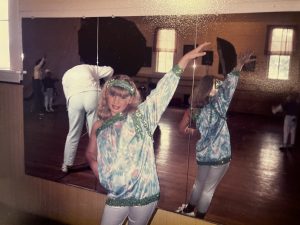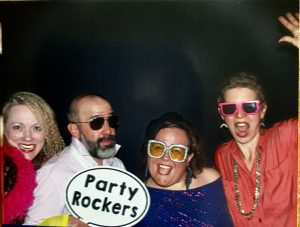“I have, I say, set out again. The days tumble with meanings. The corners heap up with poetry; whole unfilled systems litter the ice.” Annie Dillard
My days for a while were dark with cancer this winter. Not empty, but devoid of much more than just getting through. Doing the things to prop up my ailing body enough to survive and care for my kids. Making it through the day in a body/mind that I didn’t recognize. I am so deeply, beyond words grateful to be through that dark cancer winter. As Annie Dillard says, I have set out again. My days, again, tumble with meanings.
It is glorious to have the energy to run, write, think, cook, take on projects (like learning to quilt?!?) with Ida and generally spend quality time with beloved friends and family. To go out to dinner with Burke! I am celebrating this sense of fullness of life again. I don’t want to ever talk it for granted, even though I know I probably will.
Or maybe I won’t. Part of having had cancer is that you never know if it’s coming back. I’m doing what I can to prevent a recurrence, but every time I hear of someone who has a recurrence, I am reminded that that could be me. (And also, every time I hear of someone who has been cancer free for decades, I remember, that could be me, too.) I’m taking drugs, getting injected, taking herbal supplements, meditating, exercising, trying to eat more vegetables than cookies. I’m adding strength training to prevent osteoporosis, the side effect of one of the drugs I’m taking. It’s like I’m cancer free-ish.
I’ve been trying to decide if I’m done with this epoch of blogging. I’m not done processing cancer — this new awareness of the preciousness of our vulnerable bodies, the way that mortality puts pressure on us to make the most of our hours and days and years alive. But I may be done with the time of needing to process the cancer in this more private writing. (I know that, by definition, blogging is at least somewhat public, but I’ve just shared this blog with people I know and love.)
Last weekend I went to Portland to go to my friend Jennie’s “cancerversary” party. I had been telling people it was to mark 10 years of her being cancer free, though the math didn’t totally compute when I thought about talking to her about her diagnosis some years back. At her amazing 80’s-prom-themed dance party, Jennie reminded us that she was marking the anniversary of the day of her diagnosis. Ten years living with and beyond cancer. She marked time from her diagnosis because that was the day that everything changed. It felt so meaningful to celebrate with her the fact of her surviving and thriving. (Jennie is the person who I called while I sat in a thin cotton open-at-the-front hospital gown waiting for the second and last plastic surgeon I would see. It’s good to have a friend you can call to ask about personal experience and research into the realm of post-cancer breast reconstruction when you’re overwhelmed. Jennie told me what questions to ask. Jennie told me not to let them sugar coat it with “so many good choices.”)
At her party, it also felt so good for me to reconnect with my roots — with my oldest friends in the rural dance hall where I took tap and jazz dance lessons as a kid. Another treat while I was in Portland: I got to see some of my wonderful extended Hanson family, re-introducing Ida to her second cousins. She came home telling everyone about this treasure trove of extended family.
As the summer solstice approaches, I am back to running regularly — I ran five and a half miles this morning! I hope to run a 10K soon (that’s six and a half miles for those of you committed to the English system.) And I finished my first year of grad school! I still deal with imposter syndrome, but also, I can see my writing improving. I’m finding the words, the shapes, the forms to express things I didn’t know how to say before. I’m still in awe of so many writers, especially poets, who find concise ways of saying what I still dance around and around with pages and pages of words. Hopefully this year will be a year I both experiment more AND get my writing out in public (which is to say, published!).
I am almost embarrassed by the riches of the care I’ve received over the past nine months, and I’ve been holding that gratitude along with awareness of the great privilege of tender care for my body and heart. Some of that is luck and great community. For example — you all reading this. For example — so many of you taking care of Ida, bringing us food, driving extra carpools, etc. But also, some of it is about economic privilege. And I hate the fact that cancer was so hard for me, but for many people (without good insurance, or paid time off, or stable housing, etc.) it is so much harder.
And so, I’ve been thinking about the care economy. The way these things are funded being so inaccessible or unsustainable. When I teach yoga, I hold the paradox of body/heart/mind healing under capitalism. Most yoga teachers I know need to get paid. But to get paid a living wage, we would need to charge more than most people can afford or are willing to pay. I haven’t solved that one, in part because the challenges of access and inequity are so much bigger than yoga. I’ve been re-connecting with Hand in Hand, an organization working to improve working conditions for domestic workers like nannies, home care attendants, and house cleaners. These jobs that are about caring for the people we love most — they are both the most vital and intimate jobs, jobs that we undervalue by paying so, so little.
And so I recently told our family’s home care story at a Hand in Hand webinar, and I’m excited to go out door knocking with them this summer. We’ll be talking to people about both individual choices — like paying domestic workers a living wage, contributing to benefits, etc. — and collective choices, like voting to maintain Washington CARES, this first in the nation program to collectively fund homecare. I want to live in a world where we fund all kinds of care collectively, a world where people get the high quality care they need from care workers who are paid well for their critical work.
Lucas’s final assignment in history was to make a podcast on joy and resistance. (He put together an amazing final project — you can check it out here.) I’m feeling so much of that right now. Joy to be alive, running along the lake past the goose-parents who hiss at me if I get to close to their babies. And, in this election year, when I stand at the abyss of despair every time I read the news, I am reaching for ways to stay connected to collective resistance. Joy in resistance. Resistance and joy.
And so, for now, I think I am going to close this season of the blog. I’m leaning toward collective work of healing and resistance (which is to say, marching against the war on Gaza and door knocking with Hand in Hand and helping Burke raise lots of money for Movement Voter Project.) I want to be the one giving care — delivering meals, driving the carpools, holding space for yoga and self-compassion practices. And I’ll be working to write stories that are more public — sending my work out to journals, magazines, and hopefully, in the not too distant future, book agents. And I’ll keep living in this spiritual mud, this fact of the future being so absolutely unknown.
One of the great things about being in school for creative writing is that I read great writers. I just read this, from Rebecca Solnit’s “A Field Guide for Getting Lost.” She is meditating on an Edgar Allan Poe quote about “the unforeseen.” She writes, “How do you calculate the unforeseen? It seems to be an art of recognizing the role of the unforeseen, of keeping your balance amidst surprises, of collaborating with chance, of recognizing that there are some essential mysteries in the world and thereby a limit to calculation, to plan, to control.”
I told you I want to resist happy endings. But also, I want to be honest. Right now I am overflowing with gratitude. Thank you so much for reading. For accompanying me on this wild collaboration with chance and mystery. I love you.


